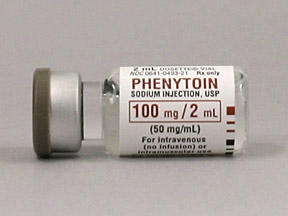
Phenytoin Sodium Coupons & Savings Card – Discount Prices from $1.01
Phenytoin, commonly known by the brand name Dilantin, is a medication that helps manage and prevent seizures, making it useful for both adults and children. Available in capsule, chewable tablet, and liquid forms, it is taken orally, with the dosage tailored to individual needs based on factors like age, weight, and seizure control effectiveness. Phenytoin is primarily prescribed for treating tonic-clonic and psychomotor seizures, as well as for preventing and managing seizures associated with brain surgery.
While the precise mechanism of action is not fully understood, Phenytoin is believed to work by stabilizing excessive electrical activity in the brain, thereby reducing the occurrence of seizures. Regular blood tests are necessary to ensure safe levels of the drug in the body and to prevent toxicity, which can lead to dangerous side effects. Common side effects include coordination difficulties, unusual eye movements, and drowsiness. It is crucial to consult healthcare professionals, such as doctors or pharmacists, for personalized medical advice and before starting any new medication or treatment plan.
Our coupons are free to use. Before paying, show the pharmacist your Phenytoin Sodium savings card to get your free discount. Use our filters below to edit the prescription box to match your needs. The Phenytoin Sodium prices will update based on your prescription needs. Above our Phenytoin Sodium coupons, you can change your location to see pharmacy prices and costs in other areas. We're here to help you buy Phenytoin Sodium at the lowest price with our prescription discount card.
My prescription
Edit
2ML of 50MG/ML, Phenytoin Sodium (1 Vial)
Select pharmacy

CVS
$19.92
COUPON PRICE
Walmart
$1.01
COUPON PRICE
Albertsons
$4.46
COUPON PRICE
Walgreens
$4.46
COUPON PRICEPhenytoin Sodium savings card
Show this card to your pharmacist
Walmart
$1.01
BIN
ID
PCN
GRP
019876
LHDA8652FC
CHIPPO
LHX
Powered by
Phenytoin, commonly known by the brand name Dilantin, is a medication that helps manage and prevent seizures, making it useful for both adults and children. Available in capsule, chewable tablet, and liquid forms, it is taken orally, with the dosage tailored to individual needs based on factors like age, weight, and seizure control effectiveness. Phenytoin is primarily prescribed for treating tonic-clonic and psychomotor seizures, as well as for preventing and managing seizures associated with brain surgery.
While the precise mechanism of action is not fully understood, Phenytoin is believed to work by stabilizing excessive electrical activity in the brain, thereby reducing the occurrence of seizures. Regular blood tests are necessary to ensure safe levels of the drug in the body and to prevent toxicity, which can lead to dangerous side effects. Common side effects include coordination difficulties, unusual eye movements, and drowsiness. It is crucial to consult healthcare professionals, such as doctors or pharmacists, for personalized medical advice and before starting any new medication or treatment plan.
Our coupons are free to use. Before paying, show the pharmacist your Phenytoin Sodium savings card to get your free discount. Use our filters below to edit the prescription box to match your needs. The Phenytoin Sodium prices will update based on your prescription needs. Above our Phenytoin Sodium coupons, you can change your location to see pharmacy prices and costs in other areas. We're here to help you buy Phenytoin Sodium at the lowest price with our prescription discount card.
More prescriptions for epilepsy
coupons from$694.51Save 15%
coupons from$37.79Save 77%
coupons from$6.68Save 90%
coupons from$442.78Save 57%
coupons from$31.24Save 76%
coupons from$44.87Save 91%
coupons from$99.31Save 47%
coupons from$60.35Save 95%
More prescriptions for epilepsy
Subvenite Starter Kit-orange Save 15%coupons from $694.51
Zarontin Save 77%coupons from $37.79
Acetazolamide Save 90%coupons from $6.68
Loreev Xr Save 57%coupons from $442.78
Keppra Xr Save 76%coupons from $31.24
Gabitril Save 91%coupons from $44.87
Primidone Save 47%coupons from $99.31
Aptiom Save 95%coupons from $60.35
Phenytoin Sodium dosage forms
Use our Phenytoin Sodium 2ML of 50MG/ML coupon with prices from $1.01 for 1 Vial. You can also use our Phenytoin Sodium 2ML of 50MG/ML coupon with prices from $1.01 for 2 Vials. We have a Phenytoin Sodium 2ML of 50MG/ML coupon with prices from $1.01 for 3 Vials.
Dosage Quantity Price from Per unit 2ML of 50MG/ML 1 Vial $1.01 $1.01 2ML of 50MG/ML 2 Vials $1.01 $0.51 2ML of 50MG/ML 3 Vials $1.01 $0.34
| Dosage | Quantity | Price from | Per unit |
|---|---|---|---|
| 2ML of 50MG/ML | 1 Vial | $1.01 | $1.01 |
| 2ML of 50MG/ML | 2 Vials | $1.01 | $0.51 |
| 2ML of 50MG/ML | 3 Vials | $1.01 | $0.34 |
